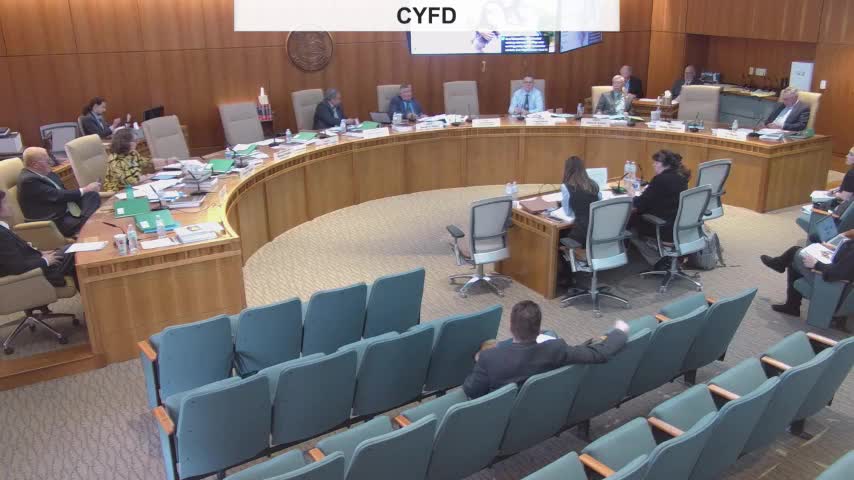Committee debates structured-settlement oversight bill; vote ends in tie
March 08, 2025 | Finance, Senate, Committees, Legislative, New Mexico
This article was created by AI summarizing key points discussed. AI makes mistakes, so for full details and context, please refer to the video of the full meeting. Please report any errors so we can fix them. Report an error »

The Senate Finance Committee considered a proposal to strengthen oversight of structured-settlement transfers, voting to a tie that left no committee recommendation.
Sponsor testimony explained the bill would permit courts to appoint a guardian ad litem or financial adviser to evaluate whether a proposed lump-sum purchase of a structured settlement is in the recipient’s best interest. The sponsor told senators most harm occurs when buyers of future payment streams offer deeply discounted lump sums to recipients who may lack financial literacy.
Why it matters: Structured settlements are commonly used to pay civil damages over time — for minors or people with long-term medical needs — and industry purchasers sometimes offer lump sums at steep discounts. Supporters said the bill would require the buyer to pay for the adviser and would give judges a financial expert’s independent assessment before approving a transfer.
Public comment and concerns: Nat Dean, a disability advocate, said structured settlements can “reduce the long term value of the settlement for the individual” and supported requirements that the court get expert advice. Other witnesses said the practice of buying structured payments is heavily marketed and can be predatory.
Opponents and questions: Committee members asked who would pay the guardian ad litem and whether the paying party could bias the adviser. Sponsor testimony explained the buyer would typically pay the adviser’s cost and that the court must appoint the advisor; senators raised concerns that the payment arrangement could create perceived conflicts. Senators also asked whether courts already have authority to approve transfers and whether the bill’s new requirement might impose unnecessary burdens on competent adults.
Committee action and vote: The sponsor moved that the substitute do pass; the roll call produced a tie vote with seven in favor and seven opposed (procedural entries in the record produced the tie). The committee announced the vote ended in a tie and did not produce a do-pass recommendation.
What’s next: Because the committee vote was tied, the bill will not automatically carry a committee recommendation and its path forward depends on further committee procedures or re-referral. Supporters said the measure responds to real examples where recipients received minimal cash relative to the present value of their future payments; critics said the bill risks judicial micromanagement of competent adults’ financial decisions.
Ending: Senators asked for more detail about guardi an ad litem qualifications and conflict-of-interest protections; the sponsor said courts would choose advisers judged to be independent and that the bill lists factors courts should consider when deciding whether a transfer is in a recipient’s best interest.
Sponsor testimony explained the bill would permit courts to appoint a guardian ad litem or financial adviser to evaluate whether a proposed lump-sum purchase of a structured settlement is in the recipient’s best interest. The sponsor told senators most harm occurs when buyers of future payment streams offer deeply discounted lump sums to recipients who may lack financial literacy.
Why it matters: Structured settlements are commonly used to pay civil damages over time — for minors or people with long-term medical needs — and industry purchasers sometimes offer lump sums at steep discounts. Supporters said the bill would require the buyer to pay for the adviser and would give judges a financial expert’s independent assessment before approving a transfer.
Public comment and concerns: Nat Dean, a disability advocate, said structured settlements can “reduce the long term value of the settlement for the individual” and supported requirements that the court get expert advice. Other witnesses said the practice of buying structured payments is heavily marketed and can be predatory.
Opponents and questions: Committee members asked who would pay the guardian ad litem and whether the paying party could bias the adviser. Sponsor testimony explained the buyer would typically pay the adviser’s cost and that the court must appoint the advisor; senators raised concerns that the payment arrangement could create perceived conflicts. Senators also asked whether courts already have authority to approve transfers and whether the bill’s new requirement might impose unnecessary burdens on competent adults.
Committee action and vote: The sponsor moved that the substitute do pass; the roll call produced a tie vote with seven in favor and seven opposed (procedural entries in the record produced the tie). The committee announced the vote ended in a tie and did not produce a do-pass recommendation.
What’s next: Because the committee vote was tied, the bill will not automatically carry a committee recommendation and its path forward depends on further committee procedures or re-referral. Supporters said the measure responds to real examples where recipients received minimal cash relative to the present value of their future payments; critics said the bill risks judicial micromanagement of competent adults’ financial decisions.
Ending: Senators asked for more detail about guardi an ad litem qualifications and conflict-of-interest protections; the sponsor said courts would choose advisers judged to be independent and that the bill lists factors courts should consider when deciding whether a transfer is in a recipient’s best interest.
View the Full Meeting & All Its Details
This article offers just a summary. Unlock complete video, transcripts, and insights as a Founder Member.
✓
Watch full, unedited meeting videos
✓
Search every word spoken in unlimited transcripts
✓
AI summaries & real-time alerts (all government levels)
✓
Permanent access to expanding government content
30-day money-back guarantee

